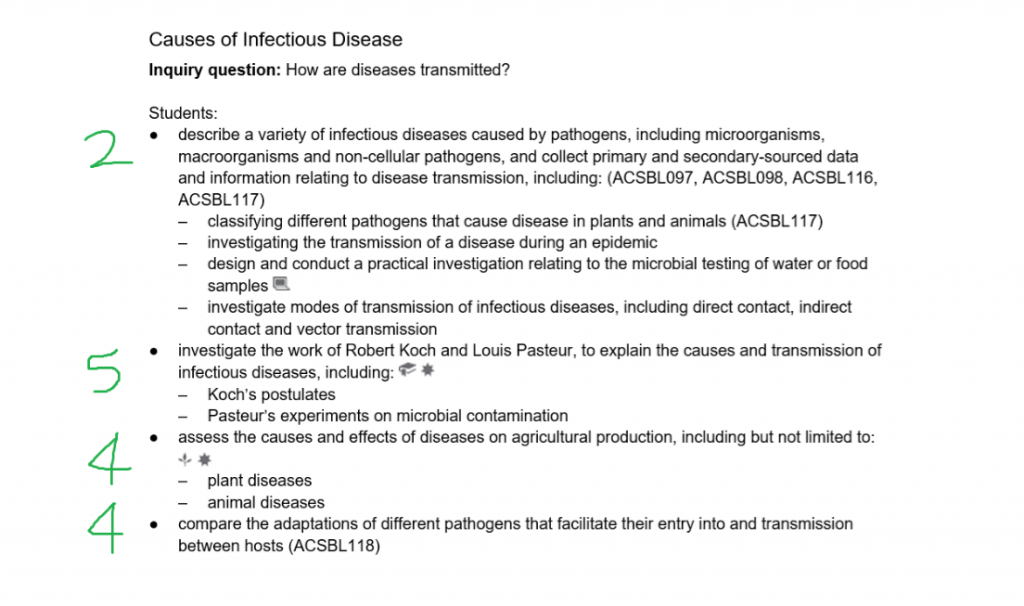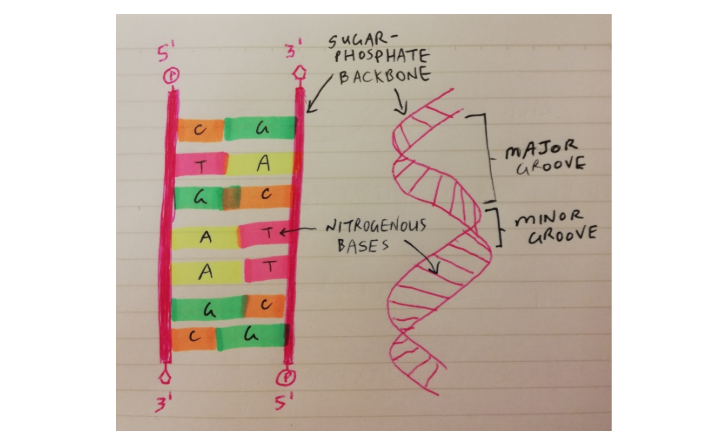Learning how to memorise HSC Biology content in time is the most common challenge that Biology students face.
Depending on how far away the HSC is, this is either a big or a small issue, but in either case, it is still a very important skill to master.
Step 1: Do a needs analysis
Step 2: Write your own notes
Step 3: Take action!
Step 4: Revisit your notes
Now, let’s put our thinking caps on for a bit and consider an important preliminary question:
Why is it so much harder to memorise HSC Biology content?
I’m glad you asked! Here are a few things which make the core content different from the electives:
Reason 1: There is heaps of it
There are four core modules you’ve got to get through in order to memorise HSC Biology content:
- Heredity (5 topics)
- Genetic Change (3 topics)
- Infectious Disease (4 topics)
- Non-infectious Disease and Disorders (5 topics)
Taking out the elective topic means that you’ve got 4 equally as meaty topics to get through—so it is completely legitimate to find memorising the core content more difficult!
Make sure you’ve mastered the fundamentals you need with a complete breakdown of Year 11 Module 1: Cells as the Basis of Life to fill any learning gaps you may have and to collect organised study notes for your upcoming exams! More module guides inside…
Reason 2: You need to know it in a lot of detail
Again, due to the meatier nature of the content, and also because everyone is expected to know this content, everyone is expected to know the content.
But you just repeated yourself twice.
Let me explain: if everyone is expected to know the same content, doesn’t it stand to reason that in order to stand out from the crowd, you should try to know it in as much detail as possible?
In fact, the questions in the HSC Biology paper are written in a way that allows people to write either in a lot of detail (if they know it), or in a little bit of detail (if they don’t know it).
This is how Band 6 students differentiate themselves from other students.
Compare:
Transcription is a complex process that turns DNA into RNA
With
Gene expression begins with transcription where the information encoded in a part of DNA is copied into mRNA.
Therefore, you will need to memorise HSC Biology content in a lot of detail to differentiate yourself from others in the state.
Reason 3: There are so many resources out there – how do I know which to use?
This does contribute to making it a bit harder to memorise HSC Biology content, as it can seem much more daunting when you go to start your notes due to the sheer volume of resources available to you.
Hopefully by the end of this article, you’ll have a better idea of how to navigate the ocean that is the Resources Available On The Interweb About Biology.
Reason 4: There’s so little time!
Ah yes. Even if you are reading this at the beginning of Year 11 time flies by very quickly and the issue of how to memorise HSC Biology content, particularly in a short amount of time, will become an issue.
For a short detour over to the land of prioritisation, click here to have a peek at what you can do to help you prioritise on a more general basis.
Have no fear! Follow these steps and you will hopefully find your Biology-related fears shrinking away as you scroll.
Step 1: Do a ‘needs analysis’ for yourself
A needs analysis is an analysis of what your needs are.
It’s the easiest way for you to assess your strengths and weaknesses in relation to the core content of the syllabus.
Okay, but how do I do it?
Simple! Take your copy of the HSC Biology syllabus and rate your understanding of each dot point:
- 1 is a poor understanding AKA ‘I am going to fail so spectacularly at this…’
- 5 is an epic understanding AKA ‘I am absolutely going to slaughter this…’
Here is one I prepared earlier:
As you can see, this does not have to be very fancy or formal.
If you like to track your progress, you can write dates beside the numbers so that you can see your improvement over time. Or, if you would prefer, you can use a pencil so that you can update your self-ratings throughout the year.
From this, make separate lists of the dot points which fall under the ratings 1-3 and those which are 4-5.
This will help you in making your priority list for study before learning how to memorise content for HSC Biology!
Step 2: Write your own notes
Do I really need to write my own notes, even though there are plenty on the internet?
Yes.
A piece of advice I often give is this: in order to maximise the amount of content that you can remember, it is best to hand-write your own notes.
This is actually backed up by science.
If you’re not completely sure about how to go about creating your study notes, head over here for some more background information.
If you feel like you’re pretty on top of writing your own notes, I’m going to add a few tips which will make your notes-writing process a bit easier and more effective:
Task 1: Start with the beginning of the topic that you are currently learning in class
This means that if you are on point ‘3.4 of Maintaining a Balance’, you should go right back to point 1.1 of this topic and start your notes there.
But why?
Doing this will allow you to start filling in the bigger picture around what you are currently learning in class. It will give you all of the background information that you need to make your current classes much more interesting.
This is what I imagine it looks like: by writing the notes from the beginning, you are filling in the gaps to catch up to where you are in class.
At the same time, by only going back to the beginning of this particular topic (rather than from the beginning of time…or the beginning of the year), you won’t overwhelm yourself and you will be able to catch up to the current topic more quickly.
Once you have caught up, start on another topic that you have already covered while continually updating your notes as you learn more in class.
Task 2: Scan your handwritten notes
There are plenty of great apps out there which will make scanning and compiling your handwritten notes really easy, such as Evernote.
There are a few reasons why this is a good idea:
- You’ll have an electronic copy
- You can store them in your Evernote account, which exists ephemerally and can be loaded on any electronic device
- It’ll be much easier to have access to your notes on your phone to memorise HSC Biology content on the bus/in the car or to check a fact than carrying a sheaf of papers
Trust me. Scan them.
Task 3: Include diagrams and pictures where you can
This doesn’t need to be as difficult as it could be and it does not matter if you have not one artistic bone in your body.
Here’s a tip: you can easily find a diagram that you like and copy it.
This is my ok-ish drawing, copied from here:
If your drawing turns out terribly, don’t worry about it!
This is because during the process of attempting the drawing, you are already revising the concepts. And this is the goal!
Wondering how to improve your marks with less time studying for HSC Biology?
Find out how to do it with our handy guide, click here!
In fact, the more terrible your drawing, the easier it is to memorise HSC Biology content.
So, what did I actually learn from redrawing this diagram?
- The 5’ (five prime) end is called that because there is a phosphate on that side
- The 3’ (three prime) end has a deoxyribose sugar
- The major groove is the space between the turns
- The minor groove is the space between the strands
It’s easy to miss details of a diagram. Redrawing helps you conceptualise things better.
Task 4: Prioritise your ratings 1-3 points
This may seem obvious, but I want to emphasise it anyway. Make sure that you spend the most time on these dot points to ensure that you understand them.
Of course, don’t forget to work on your 4-5 points too! Even if it’s just jotting down a few words to remind yourself, this will prevent them from edging towards the 1-3 category!
Step 3: Take action depending on your preferred study style
Aural learners
Record yourself reading out your notes
You can do this on your phone, using the inbuilt Voice Recorder app, or else you can look here for other recommended apps for iPhone or Android.
You’ve probably guessed it – you can listen to yourself while you’re on the bus/train/out walking/in the car! You’ll probably feel a bit strange listening to yourself at first, but you’ll get used to it!
For aural learners, it’s super helpful to not only hear the information, but also to talk it through and have it as an alternative to listening to music!
Read your notes out loud
This is kind of a precursor to the first tip, and can be really helpful if you’re not so keen on the voice recording idea.
This effectively does the same thing, but would require you to carry your notes (either in paper form or scanned onto your phone) with you wherever you go.
Teach someone the content
This is the next step from the previous two tips: rather than just repeating what you’ve already got written down, try to put yourself into the teacher’s shoes and teach it back.
But who do I teach?
Anyone! When I did my HSC year, I taught my mother everything while she was cooking dinner.
If you ask around to your parents/siblings/friends/dog, you are bound to find a willing student, or at least someone that you can bribe with chocolates or something!
This is useful because you will have to really think about the concepts and how you can best break them down for another person to understand, and it adds another layer of understanding.
Visual learners
Watch YouTube videos
I’m serious. These are excellent for visual learners to see what it is that they are learning, even if the videos are in animation form in order to memorise HSC Biology content.
Here are some great ones which I always recommend:
Draw pictures and diagrams
These can be really artistic and beautiful ones that you create on your own, or they can be not-so-great copies like the one that I did before.
They can even be as simple as flow chart.
Need some HSC Biology practice questions to use for your study?
We’ve got over 80 brand new questions for all new HSC Biology modules! Click here to find them!
Verbal learners
Verbal learners have very similar learning preferences to aural learners, so I suggest that you try out the tips for aural learners too!
Practice writing out your notes
Verbal learners like words, and so it often helps to re-write your notes many many times, each time making them slightly shorter.
To make them shorter and more summarised, use key words in the syllabus, and make your own acronyms to remember larger concepts.
For example, I will never forget A-T C-G because someone once told me to think about it as ‘Attack The/Cow Girl’. Not only is that super amusing, it’s useful because A will always pair with T and C will always pair with G.
Physical learners
Physical learners learn best by doing.
Now, since you can’t always act out protein synthesis or DNA replication you can do the following things to try and get as close to that as possible!
Draw your own diagrams and flow charts
Although you can’t really act these out, by drawing them out you are indirectly ‘acting them out’, helping you memorise HSC Biology content.
This can be really great if you pair it with explaining what you’re drawing out loud.
Take your notes for a walk
This probably sounds really strange, but try taking your notes with you on a walk or to the gym!
You can read from them or at least mull over a concept while you’re walking or working out, and you can even try to test how much you can remember while doing automatic activities (like walking and running).
This is actually backed up by science: exercise releases a chemical called brain derived neurotrophic factor, which makes it easier for your brain to learn new things. I know. Mind blowing, right?
Logical learners
Understand why things happen
For the logical learner, it is very difficult to memorise HSC Biology content if you can’t understand exactly why they occur.
This means that the best tactic is to keep searching and researching until it clicks for you. It doesn’t matter if you have to keep asking questions.
If you don’t have an Art of Smart coach at hand, Wolfram Alpha is kind of an okay substitute…
However, it can’t walk you through and explain to you in simple English why it works, then give you the challenge you need to practice it!
Draw flow charts or write step-by-step descriptions
These will help you to write out the processes and steps of reasoning which are necessary to understand the concepts. This is also very handy for answering HSC Questions…
This is also why learning the beginning of the course is helpful. You might understand the steps in transcription, but you also have to know that it is the first step in gene expression, and to understand gene expression, you might want to know about genes and phenotypes.
Good thing the syllabus is structured so you know things in a logical order. Although, your class might not follow it in order.
Filling in the gaps is critical to understanding the big picture as a logical learner.
Social learners
Study in groups!
Find yourself a good study group, or form one!
A popular way to study nowadays is Skyping each other. You don’t even have to talk. Sometimes you can study better when you know someone else is studying too, but still be in the silence and solitude of your own home.
Or, you might prefer to meet up at the library, study together and set times for breaks where you can go out and have lunch together – make a day of it!
Take it in turns to teach each other
If you assign a dot point to each person for each study session, and that person is responsible for teaching that content back to the rest of the group, the rest of the group can ask questions and this will help you to each push yourselves a bit in order to memorise HSC Biology content.
It’s also handy to put as much effort into preparing to teach your dot point as possible: make short slide shows or draw diagrams which would help make it easier for your friends!
The more effort you each put in, the more you will each get out.
Solitary learners
Although this is a style of learning on its own, it is useful to still consider which of the other styles you prefer, because this will inform you which tactics you can employ when you are studying.
Write yourself a to-do list
Peek over here for some tips on to-do lists. The key is to keep yourself accountable by setting clear goals which will help you memorise HSC Biology content.
For example, rather than saying ‘Today I will cover two dot points’, try something much more specific: ‘In this hour I will write my notes for this dot point and draw 1 diagram’.
Make a timing plan for yourself
There is a really cool technique, called the Pomodoro Technique, which is based on studying really hard for 25 minutes at a time and then taking a short break.
This is really great if you know that you struggle to stay on task for extended periods of time, and if you set clear goals with your awesome to-do list, you will be able to use those 25 minutes very effectively.
If you’re a bit more like me and can study for longer periods of time, try 50 minutes with 10 minute breaks.
Even if you think that you could give me a run for my money and study for hours at a time, it’s important to take regular breaks to give your brain time to switch off.
During your breaks, do something completely unrelated to your study. I usually reunite with my phone and check Instagram or watch some music videos.
This kind of tactic is also good for keeping me focused because I know I’ll get to check my notifications during break time!
Step 4: Continually revisit your notes
Remember that it is perfectly okay to test out a few different tactics before settling on one that works best for you.
It is even more okay to have more than one tactic at hand, and using a combination of them.
Other learning styles can supplement your learning style: for example, if you are a visual learner, you would benefit from also doing some aural learning. By explaining what you have drawn, you can put into words why or how the concept works.
You can also plan ahead for the future. If you have a diary or a calendar, you can pick a date in the near future to memorise HSC Biology content notes again to make sure you don’t forget.
Do it now – what kind of learner are you?
Between now and the HSC, continually revisit your notes and try to summarise them further to make sure that you are improving in your memory and that you are covering all of the content in the syllabus.
Remember that if you are ever struggling or feeling overwhelmed, reach out to your teacher/parents/friends for some support and some down time to gather your thoughts before you start back at the work.
Hopefully you’ve picked up a few tips on how to memorise HSC Biology content. You can do it.
Looking for extra help with HSC Biology?
We pride ourselves on our inspirational HSC Biology coaches and mentors!
We offer tutoring and mentoring for Years K-12 in a variety of subjects, with personalised lessons conducted one-on-one in your home or at our state of the art campus in Hornsby!
To find out more and get started with an inspirational tutor and mentor get in touch today!
Give us a ring on 1300 267 888, email us at [email protected] or check us out on Facebook!
Gia-Yen Luong has been an Art of Smart coach for 3 years, coaching a range of subjects including HSC English, Legal Studies, Biology, Chemistry and General Maths. She is in her final year of a mega double degree in Law/Science (Neuroscience). She graduated high school with an ATAR of 99.9 and spends most of her time trying to convince people that it’s wholly possible to get such a mark while still having a normal life during Year 12. She enjoys reading, podcasts and truly believes that she was born to be a blogger. In effect, she is a true nerd.







